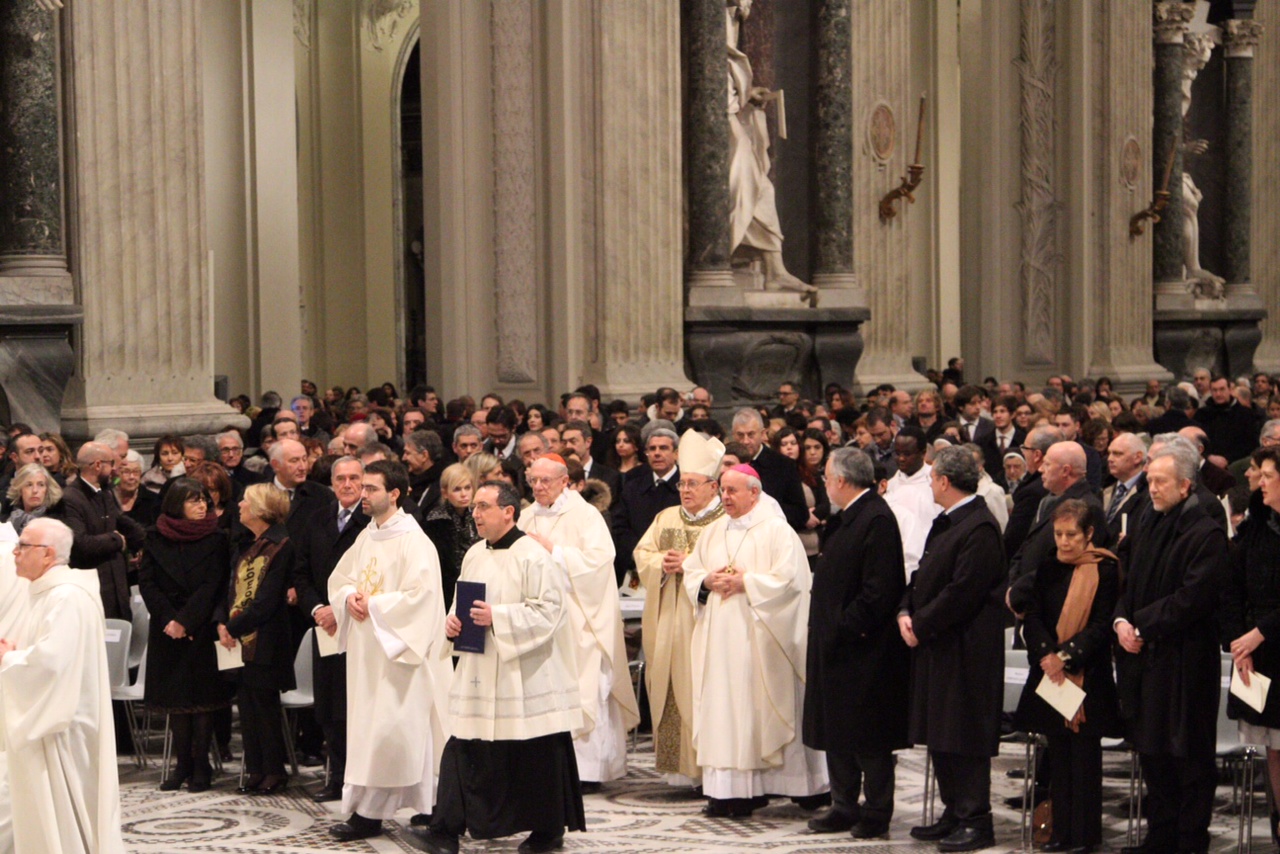 St. John Lateran partying tonight for the 47th anniversary of the Community of Sant'Egidio. From 18 onwards, despite the bitter cold, the Basilica was filled, in its naves, of a people that represented the whole city: young people, adults, inhabitants of the centre along with those that live in the peripheries and many poor people that are part of this family born in Rome in February 1968, but now widespread in 73 countries worldwide with more than sixty thousand people, plus thousands of friends and supporters. St. John Lateran partying tonight for the 47th anniversary of the Community of Sant'Egidio. From 18 onwards, despite the bitter cold, the Basilica was filled, in its naves, of a people that represented the whole city: young people, adults, inhabitants of the centre along with those that live in the peripheries and many poor people that are part of this family born in Rome in February 1968, but now widespread in 73 countries worldwide with more than sixty thousand people, plus thousands of friends and supporters.
The celebration was presided over by Cardinal Jaime Lucas Ortega y Alamino, archbishop of Havana, the protagonist of the role played by the Church in the change of relations between Cuba and the United States: "In nearly half a century - he said in his homily - the Community has created, often in a difficult world, "new things". Today, after forty-seven years, it continues to commit itself with passion and enthusiasm, in a complex and conflictive world, in the large human peripheries, to meet the poor, heal the wounds, break down the walls, give birth to peace. In a complex world, you work with evangelical simplicity".
The cardinal also recalled the unprecedented interreligious prayer for peace, promoted by the Community of Sant'Egidio in Havana, which preceded the turning point in relations between Cuba and the United States, talking about the "miracle of the thaw".
A wall, that of distrust between the two states, "that seemed unshakable, but nothing is impossible for God". He spoke of "a new time of encounter and dialogue" between Cuba and the USA and expressed his hope that "this important signal may infect the whole world", especially Ukraine, Syria and Iraq.
 The President of the Community of Sant'Egidio, Marco Impagliazzo, greeting the people who filled the basilica - including Senate President Pietro Grasso, some ministers and representatives of the institutions - after thanking Cardinal Alamino "for his great work in favour of peace and development of the Cuban people", stressed the importance of friendship with the poor as a key for measuring the humanity of our societies: "We have been explained so many things about the world that there would be no clear or understandable: they are safe compasses of the culture of human, because they show life in its truth. A humanism that is friend of the poor has in itself a sense of universality: it regards everyone and preserves the whole society from barbarism". And again: "The man and the woman of globalisation are often blocked by a life lived for themselves. For that, they know happiness very little. But happiness does not exist without generosity". The President of the Community of Sant'Egidio, Marco Impagliazzo, greeting the people who filled the basilica - including Senate President Pietro Grasso, some ministers and representatives of the institutions - after thanking Cardinal Alamino "for his great work in favour of peace and development of the Cuban people", stressed the importance of friendship with the poor as a key for measuring the humanity of our societies: "We have been explained so many things about the world that there would be no clear or understandable: they are safe compasses of the culture of human, because they show life in its truth. A humanism that is friend of the poor has in itself a sense of universality: it regards everyone and preserves the whole society from barbarism". And again: "The man and the woman of globalisation are often blocked by a life lived for themselves. For that, they know happiness very little. But happiness does not exist without generosity".
Impagliazzo finally recalled the visit of Pope Francis to the Community of 15 June last year, when he encouraged Sant'Egidio to move forward "on this road: prayer, the poor and peace", performing "the real revolution, which is that of compassion and tenderness", building friendship instead of the ghosts of enmity and indifference".
Numerous other parties and celebrations are planned in the coming days in different corners of the world, where there is the Community, all in the name of the three words, "Prayer, the Poor and Peace" that, according to Pope Francis, constitute the "programme" of the Community since its beginning.
L'omelia del card. Alamino |

